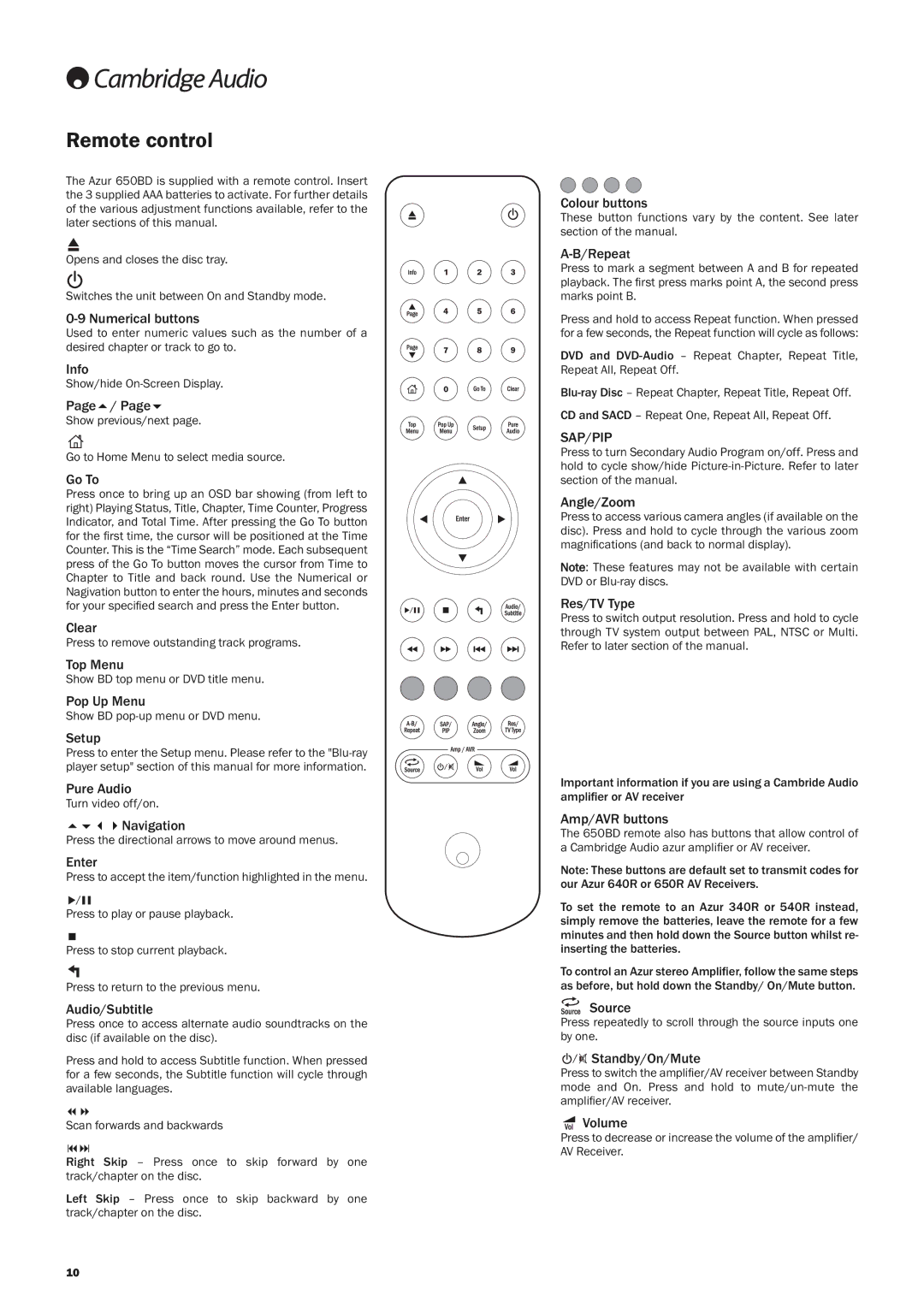
Remote control
The Azur 650BD is supplied with a remote control. Insert the 3 supplied AAA batteries to activate. For further details of the various adjustment functions available, refer to the later sections of this manual.
Opens and closes the disc tray.
Switches the unit between On and Standby mode.
Used to enter numeric values such as the number of a desired chapter or track to go to.
Info
Show/hide
Page / Page
Show previous/next page.
Go to Home Menu to select media source.
Go To
Press once to bring up an OSD bar showing (from left to right) Playing Status, Title, Chapter, Time Counter, Progress Indicator, and Total Time. After pressing the Go To button for the first time, the cursor will be positioned at the Time Counter. This is the “Time Search” mode. Each subsequent press of the Go To button moves the cursor from Time to Chapter to Title and back round. Use the Numerical or Nagivation button to enter the hours, minutes and seconds for your specified search and press the Enter button.
Clear
Press to remove outstanding track programs.
Top Menu
Show BD top menu or DVD title menu.
Pop Up Menu
Show BD
Setup
Press to enter the Setup menu. Please refer to the
Pure Audio
Turn video off/on.
Navigation
Press the directional arrows to move around menus.
Enter
Press to accept the item/function highlighted in the menu.
Press to play or pause playback.
Press to stop current playback.
Press to return to the previous menu.
Audio/Subtitle
Press once to access alternate audio soundtracks on the disc (if available on the disc).
Press and hold to access Subtitle function. When pressed for a few seconds, the Subtitle function will cycle through available languages.
Scan forwards and backwards
Right Skip – Press once to skip forward by one track/chapter on the disc.
Left Skip – Press once to skip backward by one track/chapter on the disc.
Colour buttons
These button functions vary by the content. See later section of the manual.
A-B/Repeat
Press to mark a segment between A and B for repeated playback. The first press marks point A, the second press marks point B.
Press and hold to access Repeat function. When pressed for a few seconds, the Repeat function will cycle as follows:
DVD and
CD and SACD – Repeat One, Repeat All, Repeat Off.
SAP/PIP
Press to turn Secondary Audio Program on/off. Press and hold to cycle show/hide
Angle/Zoom
Press to access various camera angles (if available on the disc). Press and hold to cycle through the various zoom magnifications (and back to normal display).
Note: These features may not be available with certain DVD or
Res/TV Type
Press to switch output resolution. Press and hold to cycle through TV system output between PAL, NTSC or Multi. Refer to later section of the manual.
Important information if you are using a Cambride Audio amplifier or AV receiver
Amp/AVR buttons
The 650BD remote also has buttons that allow control of a Cambridge Audio azur amplifier or AV receiver.
Note: These buttons are default set to transmit codes for our Azur 640R or 650R AV Receivers.
To set the remote to an Azur 340R or 540R instead, simply remove the batteries, leave the remote for a few minutes and then hold down the Source button whilst re- inserting the batteries.
To control an Azur stereo Amplifier, follow the same steps as before, but hold down the Standby/ On/Mute button.
![]()
![]()
![]() Source
Source
Press repeatedly to scroll through the source inputs one by one.


 Standby/On/Mute
Standby/On/Mute
Press to switch the amplifier/AV receiver between Standby mode and On. Press and hold to
![]() Volume
Volume
Press to decrease or increase the volume of the amplifier/ AV Receiver.
10
